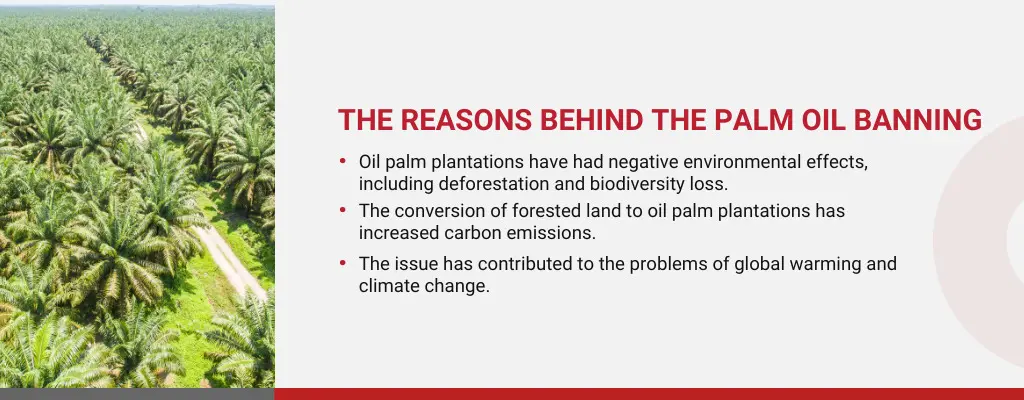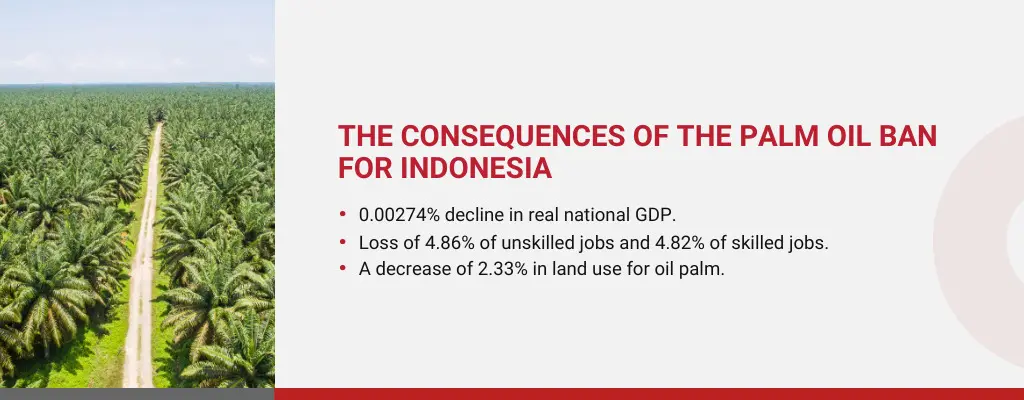The Controversy Surrounding Palm Oil Banning
The EU has approved new legislation that prohibits the entry of soy and palm oil derivatives associated with deforestation. This measure was taken as a component of the EU’s initiatives to address the problem of global warming and diminish carbon emissions.
Palm oil and soy are widely used in various products, from food to cosmetics and biofuels. The new EU law will require companies to demonstrate that their imports of these products are not linked to deforestation, or else face being banned from the market.
Environmental groups have welcomed the decision, as they have been advocating for measures to be taken to tackle deforestation for a long time.
However, some in the industry have raised concerns about the impact that the ban could have on farmers and producers in developing countries.
Read more: Indonesia to Adopt Global Minimum Tax in 2023: What It Means for Businesses
Palm Oil Banned in Europe

If companies cannot demonstrate the sustainability of their products, they will face a ban from the EU market. This new regulation will take effect in 2026 and is intended to help combat the deforestation often associated with producing these goods.
The regulation will apply to all EU member states and territories, meaning that companies that import these goods must comply with the new rules regardless of location.
The scope of this legislation is comprehensive, encompassing diverse sectors and businesses, such as food manufacturers, cosmetic producers, and biofuel makers.
The countries that are likely to be most impacted by this regulation are major producers of these goods and have a history of deforestation, such as Brazil and Indonesia.
The Reasons Behind The Palm Oil Banning
Oil palm plantations have led to negative environmental impacts, including deforestation and biodiversity loss, as evidenced by studies conducted in Kalimantan and Sumatra.
Researchers found that a significant portion of land converted to oil palm plantations was previously forested. As a result, carbon emissions from land conversion were estimated to be at an astronomical rate.
The new law serves as an important reminder to other countries that the EU is serious about taking action to combat deforestation and promote sustainable practices.
These countries must guarantee that their production techniques adhere to the sustainability criteria mandated by the EU to maintain access to the EU market.
The Impact of The Ban on Indonesia

Research shows that the ban would have a minimal impact on the Indonesian economy, resulting in a 0.00274% decline in real national GDP.
Within the sector, there would be a loss of 4.86% of unskilled jobs and 4.82% of skilled jobs, and land use by oil palm would decline by 2.33%.
The ban would reduce Indonesian economic growth but have environmental benefits in reducing CO2 emissions.
Should Indonesia Fear Losing Europe’s Palm Oil Market?
The Indonesian Palm Oil Association (Gapki) stated that Indonesia, as the world’s largest producer, should be reassured about losing the EU market since other growing markets are available.
Joko Supriyono, Gapki’s chairman, said this industry is vital for food production and bioenergy. Therefore, Indonesia’s priority should be to compete globally to promote it regardless of the market.
Although Indonesia’s exports to the EU decreased by 14% in the first 11 months of 2022, exports to the US increased by 15% over the same period.
The US is now the third-largest importer of Indonesian palm oil, mainly due to the trans fats issue and the increased use of biodiesel in several US states.
Another potential market for Indonesia is Pakistan, and there is an opportunity to set up a hub there to reach the Central Asian market.
Most Indonesian Palm Oil Companies Can Meet EU Criteria
According to the ambassador, most Indonesian palm oil companies can meet the EU criteria through the country’s certification program, the Indonesian Sustainable Palm Oil (ISPO).
Many palm oil companies in Indonesia have adopted the ISPO, which serves as a way to ensure sustainable production practices.
The ambassador emphasized recognizing and promoting the ISPO to meet global sustainability standards.
By doing so, Indonesian companies can maintain access to EU markets, improve their global reputation, and gain access to other sustainable markets.

